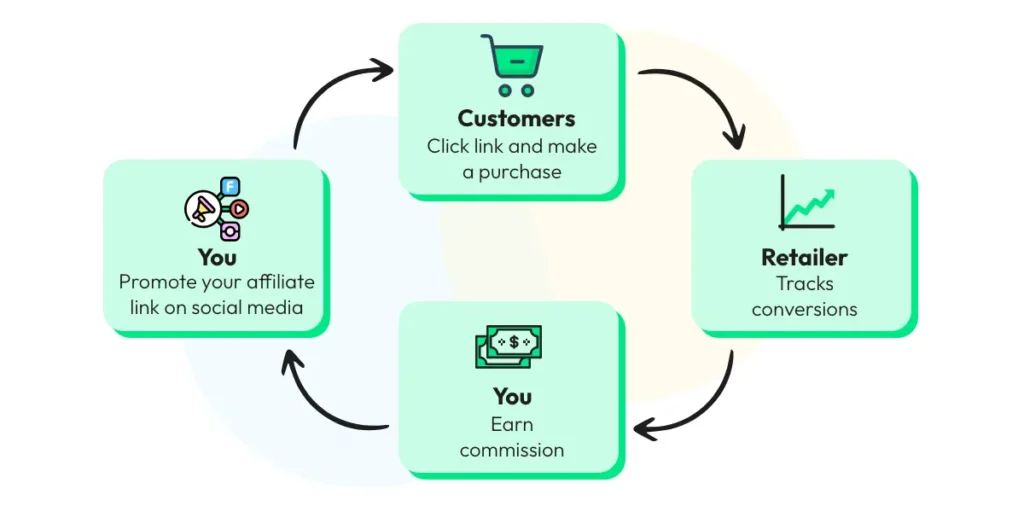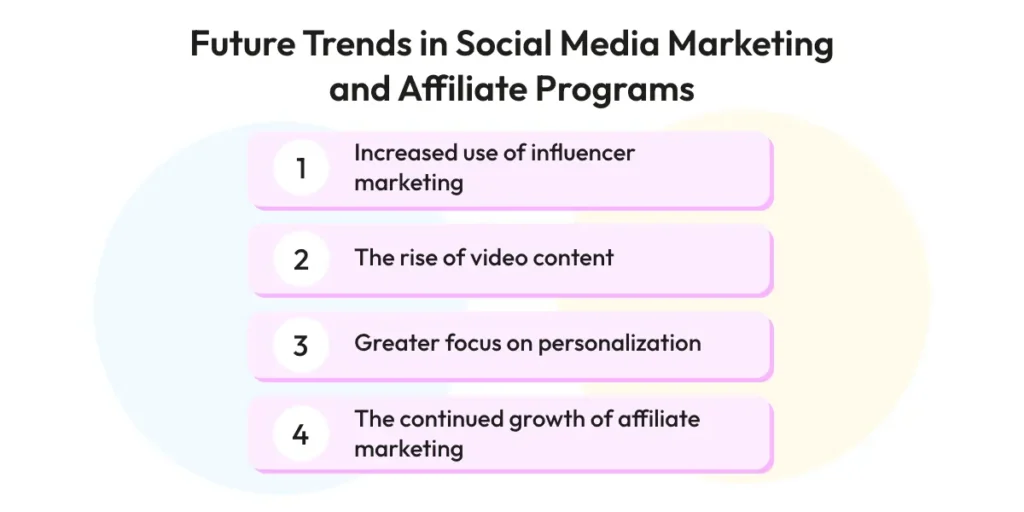
Social Media in Affiliate Marketing: How to Utilize it in 2025?
Written by:
 Ashwin
|
on:
January 4, 2024
|
Last updated on:
January 15, 2025
|
According to: Editorial Policies
Ashwin
|
on:
January 4, 2024
|
Last updated on:
January 15, 2025
|
According to: Editorial Policies
Are you a content creator looking to monetise your social media presence? Or perhaps you’re a brand seeking to expand your reach and drive more sales. In either case, social media affiliate marketing might be the answer you’re looking for.
With this powerful strategy, content creators can earn commissions by promoting brands and referring customers, while brands can tap into a wider audience without paying for traditional advertising. Let’s get started?
What is Affiliate Marketing?
Well, it’s like being a digital matchmaker. You connect people with the products they love, and in return, you earn a commission. Imagine getting a reward every time you recommend a great movie to a friend – that’s how affiliate marketing works, but in the online world.
What Role Does Social Media Play in Affiliate Marketing?

Social media affiliate marketing is a form of online marketing where content creators earn commissions by promoting brands and referring customers through social media platforms. It involves sharing affiliate links or unique discount codes on platforms such as Facebook, Instagram, YouTube, Twitter, TikTok, and Pinterest.
Affiliate marketing programs are set up by determining goals, payment models, attribution models, and commission structures. E-commerce brands and merchants can benefit from social media affiliate marketing by reaching a larger audience and only paying for actual business results. Regardless of their follower count, content creators can earn money from their content by participating in these programs.

Benefits for Brands and Content Creators
For brands:
- Reach a wider audience: Social media affiliate marketing allows brands to tap into large user bases and engage consumers on various social media platforms.
- Cost-effective advertising: Instead of paying for traditional advertising, brands only pay for the results generated by the affiliate marketing program, such as sales or leads.
- Increase sales and conversion rates: By partnering with content creators who have built trust with their audience, brands can leverage their influence to drive more sales and enhance their conversion rates.
- Access to diverse content: Content creators bring their unique perspectives and creativity to promote brands, resulting in various content styles and formats.
For content creators:
- Earn money from content: Content creators can monetize their social media presence and content by participating in affiliate marketing programs, regardless of their follower count.
- Flexibility and independence: Affiliate marketing allows content creators to choose the brands and products they want to promote, giving them control over their content and allowing them to align with their personal brand.
- Passive income potential: Once the content is created and the affiliate links are shared, content creators can earn passive income as long as their audience engages with the promotions.
- Opportunities for growth and collaboration: Successful participation in affiliate marketing programs can lead to collaborations with brands, sponsorships, and other opportunities for professional growth.
Also Read: Affiliate Marketing Mistakes to Avoid

Choosing the Right Social Media Platform for Affiliate Marketing

As social media continues to dominate the digital landscape, more and more brands and content creators are turning to social media affiliate marketing to generate income and reach a wider audience. Social media affiliate marketing allows content creators to earn commissions by promoting brands and referring customers, while brands benefit from reaching a larger audience without paying for advertising upfront. However, with so many social media platforms available, it can be challenging to determine which one is the best fit for your affiliate marketing efforts. In this section, we will provide an overview of the popular social media platforms and discuss the factors to consider when choosing the right platform for your affiliate marketing strategy.
Overview of platforms
YouTube
YouTube is a powerhouse when it comes to affiliate marketing, particularly for content creators who focus on educational and entertaining content. With its vast user base and diverse content offerings, YouTube provides ample opportunities for creators to promote products and earn commissions.
Twitter is known for its short, snappy content and is suitable for promoting consumer electronics products. Its real-time nature makes it an ideal platform for sharing affiliate links and engaging with followers.
TikTok
TikTok has quickly gained popularity, especially among younger audiences, and offers high reach and engagement. However, adding affiliate links on TikTok can be challenging due to certain restrictions and limitations on the platform.

With its large and active user base, Facebook is a popular platform for affiliate marketing, particularly in broad and general-interest niches. Content creators can leverage Facebook’s powerful targeting options to reach their desired audience and promote affiliate products effectively.
Instagram is well-suited for lifestyle niches and has good organic reach. However, adding affiliate links on Instagram can be more challenging compared to other platforms, as the platform restricts clickable links in captions. Content creators often rely on features like Instagram Stories and the bio section to drive traffic to their affiliate products.
Pinterest is a visual platform that works well for creative niches, such as fashion, home decor, and DIY. With its focus on visual content and easy integration of affiliate links, Pinterest offers a seamless experience for content creators looking to monetize their platforms.

Factors to consider in platform selection
When choosing the right social media platform for your affiliate marketing strategy, several factors should be taken into consideration:
- User base size and demographics: Consider the size and demographics of the platform’s user base to ensure that your target audience aligns with the platform’s user profile.
- Top-performing content types: Analyze the types of content that perform well on the platform and determine if they align with your content style and goals.
- Competition: Assess the level of competition within your niche on the platform. A highly saturated market may make it more challenging to stand out and gain traction.
- Organic reach and engagement: Evaluate the platform’s organic reach and engagement potential to ensure that your content will reach a significant number of users and generate meaningful engagement.
- Paid media options: Consider the availability and effectiveness of paid media options on the platform, as they can complement your organic efforts and help amplify your affiliate marketing campaigns.
- Suitability for affiliate marketing: Assess the platform’s compatibility with affiliate marketing strategies, such as the ease of adding affiliate links and the platform’s policies regarding promotional content.
By carefully considering these factors, you can choose the social media platform that best aligns with your niche, goals, content style, and budget, maximizing your chances of success in the world of social media affiliate marketing.
Also Read: How to Become an Wati Affiliate!
Best Practices for Brands in Social Media Affiliate Marketing
Affiliate marketing has become a popular brand strategy to expand their reach and boost sales. One effective method is social media affiliate marketing, which allows brands to collaborate with content creators to promote their products or services and earn commissions for every customer they refer. In this section, we will explore the best practices that brands can implement to maximize the success of their social media affiliate marketing campaigns.
Product Promotion Strategies
One of the key aspects of a successful social media affiliate marketing campaign is the promotion of products or services. Brands should make it easy for content creators to promote their offerings by providing them with comprehensive information, high-quality visuals, and engaging content. This could include product descriptions, images, videos, testimonials, and any other relevant materials that will help creators effectively communicate the value of the product to their audience.
To ensure a consistent and cohesive message, brands should also establish guidelines or templates for content creators to follow. This will help maintain brand consistency and ensure that all promotional materials align with the brand’s image and messaging.
Regular Payment Schedule and ROI Monitoring
Another important aspect of social media affiliate marketing is maintaining a regular payment schedule for content creators. Brands should establish clear payment terms and ensure timely payments to their affiliates. This not only incentivizes creators to continue promoting the brand but also fosters trust and strengthens the relationship between the brand and its affiliates.
In addition to regular payments, brands should also monitor the return on investment (ROI) of their affiliate marketing campaigns. By tracking and analyzing the performance of different affiliates, brands can identify which creators are driving the most conversions and adjust their strategies accordingly. This data-driven approach allows brands to allocate their resources effectively and optimize their affiliate marketing efforts for maximum results.

Best Practices for Content Creators in Social Media Affiliate Marketing
Recommending Trusted Products
As a content creator in social media affiliate marketing, it is essential to recommend products that you genuinely trust and use. Your audience relies on your recommendations, and if they feel deceived or misled, it can damage your credibility and trustworthiness. By recommending trusted products, you not only maintain the trust of your audience but also increase the likelihood of conversions and earning commissions.
When choosing products to promote, consider their quality, relevance to your niche, and alignment with your audience’s needs and preferences. Test the products yourself and provide honest and detailed reviews, highlighting their benefits and potential drawbacks. By sharing your personal experience and insights, you can establish yourself as an authoritative source and build stronger connections with your audience.
To further enhance your credibility, consider incorporating storytelling and personal anecdotes into your content. By sharing how a particular product has positively impacted your life or solved a problem you faced, you can create a relatable and engaging narrative that resonates with your audience. Remember to disclose your affiliate relationship and be transparent about the potential benefits you may receive from promoting the products.
Researching and Optimizing Affiliate Programs
In order to maximize your earnings in social media affiliate marketing, it is crucial to research and optimize the affiliate programs you choose to participate in. Not all affiliate programs are created equal, and by selecting the right ones, you can increase your chances of success.
Start by determining your goals and objectives. Are you looking for higher commission rates, access to promotional materials, or specialized management teams? Understanding your priorities will help you narrow down the available options and find programs that align with your needs.
When evaluating affiliate programs, consider factors such as commission rates, support from the management team, availability of promotional materials, and the reputation of the program. Look for programs that offer competitive commission rates and provide ongoing support to help you optimize your promotional efforts. Additionally, access to a wide range of promotional materials, such as banners and pre-written content, can save you time and effort in creating your own.
Use affiliate management tools, e-commerce platforms, or affiliate networks to ensure seamless tracking and accurate attribution. These tools help you monitor the performance of your affiliate links, track conversions, and analyze your promotional strategies. Regularly evaluate the performance of your affiliate programs and make adjustments as needed to optimize your earnings.
By dedicating time and effort to research and optimize your affiliate programs, you can increase your chances of success in social media affiliate marketing and maximize your earnings potential.
Wrapping it Up
Remember, you’re not just recommending products but crafting your success story. Use the right strategies, stay authentic, and dive into this digital adventure. Your journey starts now. Here’s to your success in social media affiliate marketing! 🌟🚀
Frequently Asked Questions
What is social media affiliate marketing?
Social media affiliate marketing allows content creators to earn commissions by promoting brands and referring customers.
How do brands benefit from social media affiliate marketing?
Brands benefit from social media affiliate marketing by reaching a wider audience without paying for advertising and only paying for actual business results.
How do content creators benefit from social media affiliate marketing?
Content creators benefit from social media affiliate marketing by earning money from their content, regardless of their follower count.
How can ecommerce brands and merchants benefit from social media affiliate marketing?
Ecommerce brands and merchants can benefit from social media affiliate marketing by reaching a larger audience and paying for results that impact their sales funnel.
How can affiliate marketing programs be set up?
Affiliate marketing programs can be set up by determining goals, payment models, attribution models, and commission structures.
How can tracking for affiliate programs be set up?
Tracking for affiliate programs can be set up through affiliate management tools, ecommerce platforms, or affiliate networks.
How can affiliates be found for social media affiliate programs?
Affiliates can be found by reaching out to creators, announcing the program on social channels, and making it easy to find the program on the website.
What are the best practices for brands in social media affiliate marketing?
Best practices for brands include making it easy for creators to promote products, paying on a regular schedule, and monitoring the ROI of the program.
What are the best practices for content creators in social media affiliate marketing?
Best practices for content creators include recommending products they use and trust, researching different affiliate programs, using link shorteners for affiliate links, and disclosing affiliate links in content and posts.
What do social media affiliate programs promote?
Social media affiliate programs join publishers and networks together to promote offers related to social media tools.
What are the primary traffic sources for social media affiliate programs?
The primary traffic sources for these offers are Facebook, LinkedIn, Twitter, Snapchat, and Pinterest.
What are the pros of social media affiliate marketing?
Pros of social media affiliate marketing include
- Long cookie lifespans
- Availability of account managers
- Offers available across mobile and desktop
- Risk-free vertical
- Weekly payments
- Variety of creative banners and pre-written content
What are the cons of social media affiliate marketing?
Cons of social media affiliate marketing include
- The challenge of gaining traction at first
- The need for an established platform or channel
- Potential changes in program terms
- The time and effort required to achieve consistent income
How does social media affiliate marketing work?
Social media affiliate marketing works by driving users to a specific service or offer and earning a commission based on the completion of an action by the referred person.
What are the benefits of joining social media affiliate programs?
Benefits of joining social media affiliate programs include high commission rates, specialist management teams, automatic commission payments, access to earnings data and promotional materials, and potential for lifetime commissions on other products.
What key factors should be considered when choosing a social media affiliate program?
Key factors to consider when choosing a social media affiliate program include commission rate, management team support, and availability of promotional materials.
Which social media platforms are best for affiliate marketing?
The best social media platforms for affiliate marketing depend on the niche, goals, content style, and budget.
What is the suitability of YouTube for affiliate marketing?
YouTube is a popular platform for affiliate marketing, with a focus on educational and entertaining content.
How is Twitter suitable for affiliate marketing?
Twitter is best for short, snappy content and is suitable for promoting consumer electronics products.
What is the suitability of TikTok for affiliate marketing?
TikTok is a young, fun-loving platform with high reach and engagement, but adding affiliate links can be challenging.
How is Facebook suitable for affiliate marketing?
Facebook has a large and active user base, making it popular for affiliate marketing, especially in broad and general-interest niches.
What is the suitability of Instagram for affiliate marketing?
Instagram is suitable for lifestyle niches and has good organic reach, but adding affiliate links can be difficult.
What is the suitability of Pinterest for affiliate marketing?
Pinterest is a visual platform that works well for creative niches, and adding affiliate links is easy.
What factors should be considered when choosing a social media platform for affiliate marketing?
When choosing a social media platform for affiliate marketing, consider factors such as user base size and demographics, top-performing content types, competition, organic reach and engagement, paid media options, and suitability for affiliate marketing.





Latest Comments